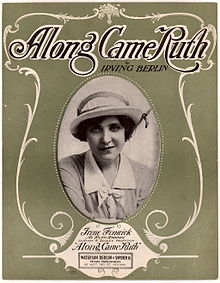Holman Day
Holman Day | |
|---|---|
 Holman Day in 1921 | |
| Born | Holman Francis Day November 6, 1865 |
| Died | February 19, 1935 (aged 69) |
| Occupation | Author |
Holman Francis Day (November 6, 1865 – February 19, 1935)[1] was an American author, born at Vassalboro, Maine. The Holman Day House, his home in Auburn, Maine, is listed on the National Register of Historic Places. His book The Rider of the King Log was adapted into the 1921 film The Rider of the King Log. His play Along Came Ruth was adapted into the 1924 film Along Came Ruth.
Personal life[edit]
Day married Helen Gerald, the only daughter of railroad engineer Amos F. Gerald and Caroline W. Rowell. She died in 1902 at the age of 32, and was interred in Maplewood Cemetery in her father's home town of Fairfield, Maine; Day, meanwhile, was buried in Nichols Cemetery in his hometown of Vassalboro, Maine, upon his death in 1935.[2]
Career[edit]

He graduated from Colby College (class of 1887) and in 1889-90 he was managing editor of the publications of the Union Publishing Company in Bangor, Maine. He was also editor and proprietor of the Gazette in Dexter, Maine, a special writer for the Journal in Lewiston, Maine, representative of the Boston Herald, and managing editor of the Daily Sun in Lewiston. From 1901 until 1904 he was military secretary to Gov. John F. Hill of Maine.
He came to Carmel-by-the-Sea, California in the 1920s.
The main poet of Maine and no small man in Carmel! Much too busy to do much visiting but when he does it's a tonic to listen to him. His many novels contain adventures in the big woods and sturdy outdoor life. He says the first 'pome' he ever wrote for the Lewiston Journal brought a libel suit on the paper and put a blackhand value on his three stanza gem to the extent of a sum never received by the great Longfellow in his palmiest days. "Started right out as a high priced poet," he says.
Works[edit]
- Up in Maine (1901), verse
- Kin O'Ktaadn (1904)
- The Bye-Bye Chair[4] (1904), excerpts from this poem were used by Congressman James Thomas Heflin in his May 1914 Mother's Day speech
- Squire Phin (1905; 1913), a novel dramatized as The Circus Man and produced in Chicago in 1909
- Rainy Day Railroad War[5] (1906; 1913)
- The Eagle Badge (1908)
- King Spruce[6] (1908)
- The Ramrodders[7] (1910)
- The Skipper and the Skipped[8] (1911)
- The Red Lane: A Romance of the Border (1912)
- The Landloper[9] (1915)
- Along Came Ruth play produced in New York, (1914)
- Blow the Man Down[10] (1916)
- Where Your Treasure Is (1917)
- Kavanagh's Clare (1917)
- The Rider of the King Log (1919)
- When Egypt Went Broke[11] (1920)
- All Wool Morrison[12] (1921)
- Joan of Arc of the North Woods (1922) [13]
- The Ship of Joy (1931) Schwabacher-Frey Company: San Francisco
References[edit]
- ^ GoodReads
- ^ Heseltine, Charles D. (9 March 2015). The Illustrated Atlas of Maine's Street & Electric Railways: 1863–1946. PWM. ISBN 978-1502406224.
- ^ "Who's Who-and Here". Carmel Pine Cone. Carmel-by-the-Sea, California. 1928-12-14. pp. 9–15. Retrieved 2022-10-17.
- ^ The Bye-Bye Chair
- ^ The Rainy Day Railroad War by Holman Day
- ^ King Spruce, A Novel by Holman Day
- ^ The Ramrodders: A Novel by Holman Day
- ^ The Skipper and the Skipped: Being the Shore Log of Cap'n Aaron Sproul by Day
- ^ The Landloper: The Romance of a Man on Foot by Holman Day
- ^ Blow The Man Down: A Romance Of The Coast by Holman Day
- ^ When Egypt Went Broke: A Novel by Holman Day
- ^ All-Wool Morrison by Holman Day
- ^ Joan of Arc of the North Woods by Holman Day
This article incorporates text from a publication now in the public domain: Gilman, D. C.; Peck, H. T.; Colby, F. M., eds. (1905). New International Encyclopedia (1st ed.). New York: Dodd, Mead. {{cite encyclopedia}}: Missing or empty |title= (help)
External links[edit]
- Works by Holman Day at Project Gutenberg
- Works by or about Holman Day at Internet Archive
- Works by Holman Day at LibriVox (public domain audiobooks)

- Holman Francis Day at IMDb
- 1865 births
- 1935 deaths
- 20th-century American novelists
- Colby College alumni
- People from Vassalboro, Maine
- People from Dexter, Maine
- 20th-century American poets
- 20th-century American dramatists and playwrights
- American male novelists
- American male poets
- American male dramatists and playwrights
- 20th-century American male writers
- American novelist, 19th-century birth stubs
